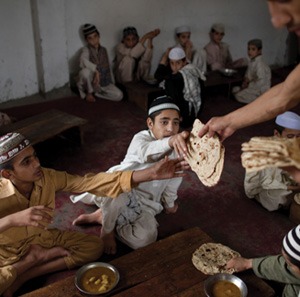
This article is a preview from the Winter 2019 edition of New Humanist
In September 2011 I took a month-long CELTA course to gain a qualification in teaching English as a foreign language. I was in the middle of a PhD project about race and racism in Naples, Southern Italy, and I was about to start fieldwork. My intention was to offer a free English course for migrants in a mosque in the city as a way of giving something back to the communities who had agreed to help me with my research. I told my CELTA class in the UK about this and the teacher warned me not to idealise the idea of teaching migrants and refugees. She regaled us with stories about violent episodes and panic buttons installed in classrooms.
I knew people with refugee status and these comments felt both morbid and melodramatic. Language learning is a key issue in fraught contemporary debates about migration. We are all now familiar with the videos that go viral on the internet at regular intervals where an individual is shown or heard shouting something like “speak English!” (or another national language) at people. The victims guilty of speaking another tongue are usually not white and are speaking a language associated with migration, as opposed to tourism. Angry instructions to speak or learn a language are one way in which racist abuse is meted out.
These episodes of individual racism reflect the nationalist idea that people must speak the dominant language of the country they live in. New arrivals are frequently told they need to learn the national language in order to integrate, and sometimes as a precondition to being granted entry and leave to remain. This directive is issued at regular intervals by politicians and is embedded in immigration legislation and structures. In a moment characterised by economic austerity and security fears, the question of language frames discussions about community, safety and shared resources.
At the same time, language learning can enable migrants to speak for themselves, organise their lives and politically vindicate their right to stay and prosper in their new home. This is why I ignored the teacher I met during training and set up my own free English classes in Naples in 2012. Here’s what the experience taught me.
* * *
Lesson One: don’t tell people what languages they need to learn. I came to set up my English classes through Asli, a Somali woman and mum of three who got involved in community organising through her local mosque. The idea was that a lot of Somali people in Naples had family members in the UK whom they occasionally visited. Being able to speak English is considered a valuable skill globally and, in their case, could better connect them to the wider Somali diaspora. Asli advertised the course through her networks and I started organising my classes. The first week, about 20 people showed up and we learned basic introductions. It was fun. The following week it was really cold in the city and no one showed up. I carried on and eventually established a fixed class of about six regular students. Excluding one man, who was Egyptian and an imam at the mosque, everyone was from Somalia. They had all been living in Naples for a number of years and spoke Italian.
The teaching room at the mosque was painted a garish green. It had a blackboard and rows of desks. I cut letters out of big pieces of card and stuck them to the wall at the beginning of the course. I had a beginner English textbook and a literacy book. I also had a friend who let me photocopy pages of the books for free in their shop. Asli provided pen and paper. I didn’t have the CD for doing listening exercises and would read out the listening transcripts at the back of the book for the students to answer the comprehension questions. We started working our way through the textbook.
Then word got round that free English classes were being offered at the mosque, and groups of newly arrived Nigerien, Chadian, Sudanese and Ethiopian migrants started joining the class. They were awaiting the result of their asylum applications, having recently travelled to Italy via boat from Libya as it collapsed into civil war. Over two or three weeks, my class quintupled in size. Fortunately, one of the other imams at the mosque was a Ghanaian man who spoke both Arabic and Hausa. He was able to help me speak with the new members of my class. They wanted to learn English but I told them it would be better for them to learn Italian first. I also suggested learning literacy as, from my initial discussions, I could see this was needed as a foundation in most of their cases. This caused a lot of frustration. One man told me he was intending to go to the UK after he had got his Italian visa documents. However, I refused to change my mind and offered beginner Italian and literacy alongside the beginner English classes I had already started.
In retrospect, this decision was deeply arrogant. Most of the second group of students that came to learn with me stayed in the class, and we had some great classes. But who was I to say what languages people should learn? And who was I to presume where people would or wouldn’t end up living? Many people who arrive in Italy use it as a launching pad for heading further north into France and Germany, where there is more work and opportunity. I may have been well-meaning but, by insisting that they needed to learn Italian over English, I was reinforcing the ideology behind hostile immigration laws that trap people and stop them living full lives.
* * *
Lesson Two: commit to messy and incomplete translation. Having foolishly placed myself in the position of teaching both English and Italian, I also had other challenges to contend with. Two older Somali women struggled to get beyond the first class or learn the alphabet. One woman, Halima, had issues with her eyesight that had never been diagnosed or treated. Another woman, Habiba, had some sort of specific learning issue that I wasn’t qualified to help her with. She never got beyond the letter C and couldn’t connect the sounds to the shapes of the letters. Both women continued to come to my classes until I ended the course in July. It became more of a social event in their week. We would drink tea and chat about our lives.
Some of my students told me they had never been to any school before arriving in Italy. This was the case with a lot of the Nigerien refugees. We spent our time learning how to put Italian sounds together and role-playing various scenarios like buying food in the market, going to the hospital and so forth. I typed and printed these scenarios up myself and they practised them with me before performing them in front of the class, sometimes with props.
Some people, like my dear friend Ilham, whom I had met through friends in anti-racist activism, had been exclusively to Koranic schools. Ilham was in her mid-20s like me. She was divorced and had a seven-year-old son, who was still in Somalia with her mother, and she was working to pay for a visa to travel safely to Europe.
She had learnt the whole Koran by heart by the age of 15, but she told me she couldn’t recite it all now. “Dunya [the world] took it away,” she explained. Ilham would go to any free classes being offered in the city and would learn anything you put in front of her. Others, like Saley, had finished school and learned a European language. He was a qualified mechanic and had been working in this profession in Libya before civil war broke out.
Throughout all this we worked hard to translate for and understand each other. Some people started to tell me about their experience of crossing the Mediterranean. One Somali man, Abdourahim, described a flat expanse of sea that reflected the moon the whole way across. He only vomited once, when they docked in the port in Lampedusa, because of the smell of the petrol. It was a messy and open-ended process of speaking across boundaries. Embracing this was one way in which we worked through some of the structural inequalities between us.
* * *
Lesson Three: teach languages to excite and incite resistance. In Teaching to Transgress: Education as the Practice of Freedom (1994) bell hooks writes that classrooms should be spaces full of emotion and excitement where people can learn how to strive towards freedom from oppression. The moments where we were able to seize joy and generate resistance in our classroom were really important.
Once, Ilham started to explain to me that Italy had colonised Somalia and that was why the country had so many difficulties today. She tripped over the conjugation of the verb “to colonise” in Italian. So we stopped and wrote up the whole conjugation of the verb in present and past tenses before she resumed her account.
On another occasion we learned how to write and read the Italian word “ciao”; not a simple task if you don’t know that “ci” in Italian is pronounced as a soft sound, like “ch” in English. I asked them to copy the word 10 times and then I asked one of the students, Rabou from Niger, to read it out. He struggled for a few seconds and then suddenly shouted “ciao!” He looked at me in consternation and then triumph. Then everyone laughed. The epiphany of being able to recognise and read out a common word he had been hearing for many months, in the confusing babel of his migration experience, was empowering for him.
At the end of the course we had a party, played games and took lots of blurry photos. But what became of everyone? As far as I know, everyone who was waiting for asylum claims to be processed did get a visa eventually. But there was, and continues to be, very little work in Italy. The austerity measures of 2012 have been superseded by an increasingly hostile climate for migrants in Italy and across Europe.
Many people granted refugee status in 2012 were only given temporary visas and subsequently became undocumented. Some of the people I taught are still in Naples. At least one of my students still lives there and is working as a street vendor whilst participating in the city’s anti-racist networks. But most of them have moved to the north of Italy or elsewhere in Europe.
The final lesson I learned was that language learning could be used to speak back to power. But the tendency to patronise and to exaggerate differences was an ever-present danger. The classroom became a mirror for a growing politics of exclusion in wider society. I remain hopeful, but continue to watch as borders and hierarchies amputate possibilities for joy, growth and collective resistance around the world today.

